Specific leaf area is lower on ultramafic than on neighbouring non-ultramafic soils
IF 1.6
4区 生物学
Q2 PLANT SCIENCES
引用次数: 3
Abstract
ABSTRACT Background Specific leaf area (SLA) is a core trait within the leaf economic spectrum that describes differences in plant performance and productivity. Research on the sources of variation in the leaf economic spectrum and SLA has primarily focused on climate. Much less is known about SLA variation across unusual edaphic environments, such as on ultramafic soils. Aims To determine the role of ultramafic soils as a driver of SLA variation. Methods We measured SLA for dominant species on paired ultramafic and non-ultramafic soils in five biogeographically distinct regions around the globe and compared mean SLA values to globally reported values. Results SLA was lower on ultramafic than on non-ultramafic soils in all regions, except Puerto Rico, and both climate and soil were important drivers of SLA. For three of the five regions, SLA values on ultramafic soils were lower than the global average. Conclusions Soils can be a major driver of SLA along with climate. Low SLA on ultramafic soil points to selection for stress resistance strategies. Furthermore, in some bioregions, SLA values on ultramafic soils were among the lowest on the planet and thus represent globally rare phenotypes that should be conserved within these unique edaphic habitats.比叶面积在超基性土壤上比在邻近的非超基性土壤上低
比叶面积(SLA)是叶片经济谱中描述植物性能和生产力差异的核心性状。对叶片经济谱和SLA变异源的研究主要集中在气候方面。在不同寻常的土壤环境中,例如在超镁质土壤中,人们对SLA的变化知之甚少。目的探讨超镁质土对土壤质量指数变化的驱动作用。方法测量了全球5个不同生物地理区域的超镁铁质和非超镁铁质配对土壤中优势物种的SLA,并将平均SLA值与全球报道值进行了比较。结果除波多黎各外,所有地区超镁质土壤的SLA都低于非超镁质土壤,气候和土壤都是SLA的重要驱动因素。5个地区中有3个地区的超镁质土壤的SLA值低于全球平均水平。结论土壤与气候一起可能是SLA的主要驱动因素。超塑性土的低SLA为抗应力策略的选择指明了方向。此外,在一些生物区域,超镁质土壤的SLA值是地球上最低的,因此代表了全球罕见的表型,应该在这些独特的土壤栖息地中得到保护。
本文章由计算机程序翻译,如有差异,请以英文原文为准。
求助全文
约1分钟内获得全文
求助全文
来源期刊

Plant Ecology & Diversity
PLANT SCIENCES-
CiteScore
3.30
自引率
0.00%
发文量
26
审稿时长
3 months
期刊介绍:
Plant Ecology and Diversity is an international journal for communicating results and novel ideas in plant science, in print and on-line, six times a year. All areas of plant biology relating to ecology, evolution and diversity are of interest, including those which explicitly deal with today''s highly topical themes, such as biodiversity, conservation and global change. We consider submissions that address fundamental questions which are pertinent to contemporary plant science. Articles concerning extreme environments world-wide are particularly welcome.
Plant Ecology and Diversity considers for publication original research articles, short communications, reviews, and scientific correspondence that explore thought-provoking ideas.
To aid redressing ‘publication bias’ the journal is unique in reporting, in the form of short communications, ‘negative results’ and ‘repeat experiments’ that test ecological theories experimentally, in theoretically flawless and methodologically sound papers. Research reviews and method papers, are also encouraged.
Plant Ecology & Diversity publishes high-quality and topical research that demonstrates solid scholarship. As such, the journal does not publish purely descriptive papers. Submissions are required to focus on research topics that are broad in their scope and thus provide new insights and contribute to theory. The original research should address clear hypotheses that test theory or questions and offer new insights on topics of interest to an international readership.
 求助内容:
求助内容: 应助结果提醒方式:
应助结果提醒方式:


